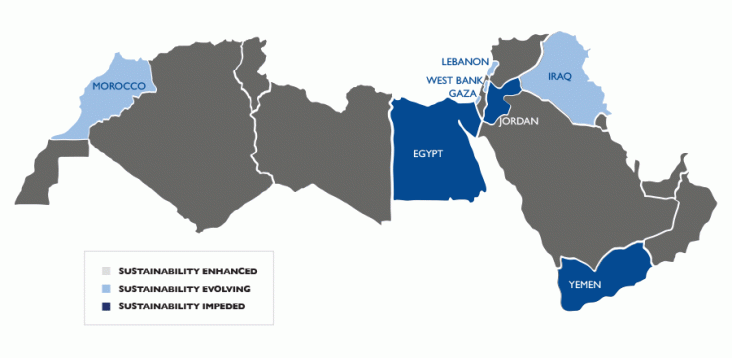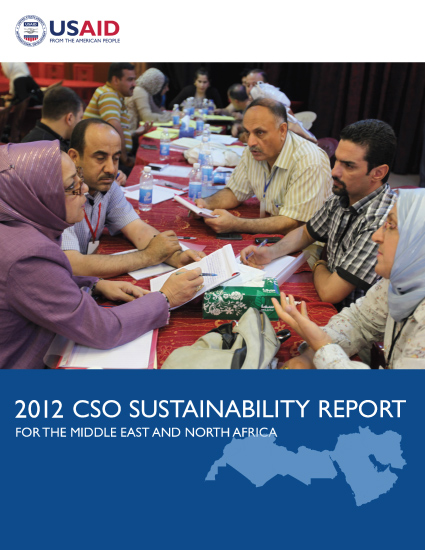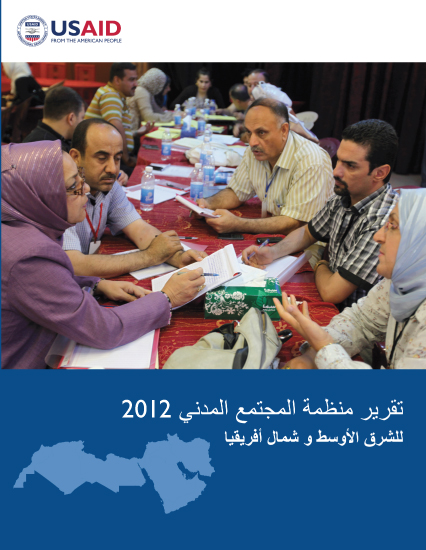- What We Do
- Agriculture and Food Security
- Democracy, Human Rights and Governance
- Democracy, Human Rights and Governance Strategy
- Supporting Free and Fair Elections
- Supporting Vibrant Civil Society & Independent Media
- Protecting Human Rights
- Promoting Accountability & Transparency
- Importance of Democracy, Human Rights, & Governance to Development
- Countering Trafficking in Persons
- Economic Growth and Trade
- Education
- Ending Extreme Poverty
- Environment and Global Climate Change
- Gender Equality and Women's Empowerment
- Global Health
- Water and Sanitation
- Working in Crises and Conflict
- U.S. Global Development Lab
BACKGROUND
USAID is pleased to present the second edition of the Civil Society Organization (CSO) Sustainability Report for the Middle East and North Africa (MENA) for Calendar Year 2012. The report relies on local expertise to assess key components of the CSO sectors in Egypt, Iraq, Jordan, Lebanon, Morocco, and Yemen, as well as in the West Bank and Gaza. The CSO Sustainability Report for 2012 is intended to serve as a useful information source for CSOs, governments, donors, and academics to better understand key aspects of sustainability of the CSO sector.
APPROACH
The Report analyzes seven interrelated dimensions of CSO sustainability: legal environment, organizational capacity, financial viability, advocacy, service provision, infrastructure, and public image. In each country/territory, a local CSO partner convenes a diverse expert panel of CSO experts and representatives. The country panels discuss and assess the seven dimensions for the year covered, placing each dimension, as well as CSO Sustainability overall, in one of three categories: Sustainability Enhanced, Sustainability Evolving, or Sustainability Impeded. The CSO partners then develop the country reports using desk research and information provided by the expert panel.
FINDINGS
All countries covered by this report remain in the same level of CSO sustainability as in 2011. Egypt, Jordan, and Yemen fall into Sustainability Impeded, the lowest level of CSO sustainability. Egypt has the most (five) dimensions rated in the Sustainability Impeded category—legal environment, organizational capacity, financial viability, advocacy, and public image. CSOs in Egypt continue to suffer from extensive legal restrictions, government harassment, and a negative media campaign against them, while a lack of stable funding continues to undermine Egyptian CSOs' abilities to develop strategic plans, hire qualified staff, and exercise effective management.
Iraq, Lebanon, Morocco, and the West Bank and Gaza fall into the middle range of CSO sustainability, Sustainability Evolving. Lebanon is the only country with a Sustainability Evolving rating in all dimensions, while all other countries fall into Sustainability Impeded for organizational capacity, financial viability, and at least one other dimension. In the wake of the Arab Spring, CSOs around the region increasingly engaged in advocacy in 2012, with five countries—Egypt, Morocco, Jordan, Lebanon, and Yemen—reporting improvements in advocacy during the year. While CSO advocacy capacity is still limited and government responsiveness is mixed, CSOs in these countries stepped up their advocacy for human rights, more enabling CSO laws, economic opportunities, and anti-corruption measures. In addition, CSOs in some countries were engaged in discussions surrounding democratic processes, including constitutional reform and elections.
Financial viability and organizational capacity remain the weakest dimensions, with five of the seven countries in Sustainability Impeded in both dimensions. CSOs across the region depend heavily on foreign funding and do not have reliable funding for the long-term. As a result, CSOs often change their missions and plans to align with donor priorities and have difficulties retaining qualified staff or engaging in strategic planning. In turn, the lack of organizational capacity undermines the ability of CSOs to raise funds from diverse sources. Although financial viability and organizational capacity continue to affect the range and quality of services offered, service provision is the strongest dimension of CSO sustainability, with all countries in the Sustainability Evolving category. CSOs in most countries provide a wide range of services to address basic needs, such as health, education, and housing, as well as the special needs of marginalized and vulnerable populations, such as persons with disabilities. Less frequently, services go beyond basic needs to address issues such as environmental protection and women’s empowerment.










Comment
Make a general inquiry or suggest an improvement.